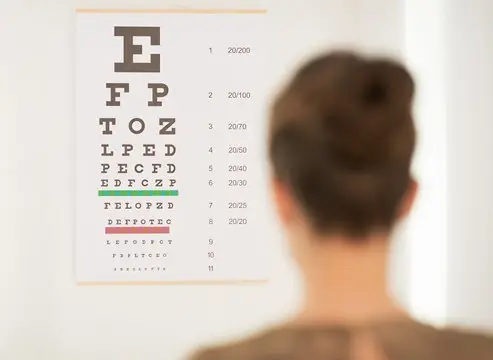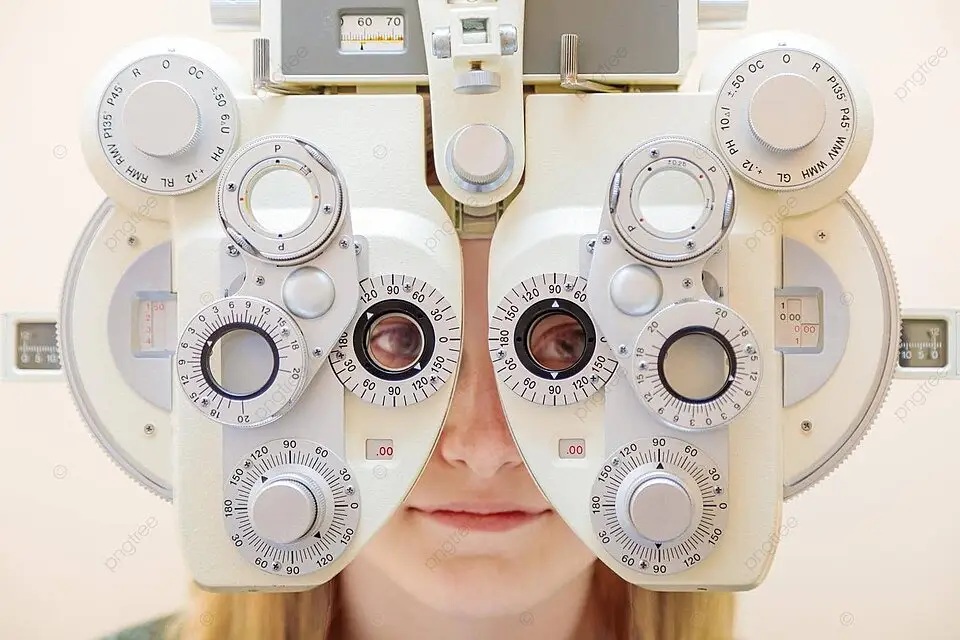Struggling to see clearly or just realizing that distant objects aren’t as sharp as they used to be? If you’ve been told your vision might be around 6/12, you might be curious: what exactly does that mean? In this blog, we’ll explore everything about 6/12 vision: what it signifies, why it happens, and how you can improve your eyesight. Let’s get started!
Contents
What Does 6/12 Eyesight Mean?

When we talk about 6/12 vision, we’re referring to a specific level of visual acuity. But what does this term actually tell us about a person’s ability to see?
If you have 6/12 vision, it means that what you can clearly see at 6 meters, a person with standard (or “normal”) vision can see at 12 meters. Essentially, your vision is half as effective at distance as that of a person with 6/6 (or 20/20) vision, which is considered the benchmark for normal vision.
Therefore, having 6/12 vision indicates a reduction in visual acuity compared to the ideal standard. Understanding that 6/12 vision means a decrease in your ability to discern fine details at a distance helps in recognizing the need for corrective measures, such as glasses or contact lenses, to enhance clarity and reach closer to the standard vision or beyond.
Causes of 6/12 Vision
Several factors can contribute to a decrease in visual acuity to 6/12, including:
- Myopia (Nearsightedness): Difficulty seeing distant objects clearly.
- Hyperopia (Farsightedness): Trouble focusing on close objects.
- Astigmatism: Distorted or blurred vision at all distances due to an irregularly shaped cornea.
- Cataracts: Clouding of the eye’s natural lens, leading to a decrease in vision.
- Age-Related Macular Degeneration: Deterioration of the central portion of the retina, affecting sharp, central vision.
- Diabetic Retinopathy: Vision impairment due to damage to blood vessels in the retina caused by diabetes.
- Glaucoma: Increased pressure inside the eye that can damage the optic nerve and impair vision.
Impact of 6/12 Vision on Daily Life

Having 6/12 vision can significantly influence various aspects of daily life, impacting both practical activities and overall quality of life. Here are some ways in which this level of visual acuity might affect everyday tasks:
- Driving: Reduced visual acuity can make it harder to read road signs, recognize faces, and respond to changes in traffic conditions from a distance. This could potentially compromise driving safety, especially under conditions of poor lighting or bad weather.
- Reading: People with 6/12 vision may find it challenging to read fine print or see details on a computer screen without corrective lenses. This can lead to eye strain and headaches, particularly during extended periods of reading or screen time.
- Workplace Productivity: Difficulty in seeing clearly can affect performance in jobs that require precise visual tasks such as working with small parts, detailed drawings, or extensive computer use.
- Recreational Activities: Visual impairment might limit participation in sports or hobbies that require good vision, such as golf, tennis, or crafting, affecting leisure time and overall life satisfaction.
- Safety: Reduced sharpness in vision increases the risk of accidents at home, work, or while navigating in public spaces, as one might not see obstacles, steps, or uneven surfaces clearly.
- Social Interactions: Difficulty in recognizing faces and social cues from a distance can impact social interactions and contribute to feelings of isolation or frustration.
Do I Need Glasses for 6/12 Vision?
If you have 6/12 vision, glasses or other corrective measures are generally recommended to enhance your vision to normal levels. Here’s how glasses can help improve your vision:
- Glasses can correct your vision to the normal 6/6 (or 20/20) standard, allowing you to see details at a distance clearly and sharply.
- Corrective lenses can help reduce the strain on your eyes that occurs when you attempt to focus on objects with uncorrected vision.
- Better visual acuity can improve your overall safety.
- Correcting your vision to a normal level can improve your overall quality of life by making daily activities easier and more enjoyable, enhancing your performance at work or school, and improving your ability to participate in recreational activities.
If you suspect you have 6/12 vision or are experiencing any difficulties with your sight, it’s advisable to visit an eye care professional for a comprehensive eye exam.
Can 6 By 12 Vision Be Cured?
Whether 6/12 vision can be “cured” depends on the underlying cause of the reduced visual acuity. Here’s how different scenarios might be addressed:
- Refractive Errors: If 6/12 vision is due to common refractive errors like myopia (nearsightedness), hyperopia (farsightedness), or astigmatism, it can typically be effectively corrected with prescription glasses, contact lenses, or refractive surgery such as LASIK. These methods can restore vision to near-normal or normal levels,
- Cataracts: If the reduced vision is due to cataracts, cataract surgery, which involves replacing the clouded lens with an artificial lens, can restore vision effectively, essentially “curing” the vision impairment caused by the cataract.
- Age-related Macular Degeneration or Diabetic Retinopathy: For conditions like age-related macular degeneration (AMD) or diabetic retinopathy, there is no cure as such, but treatment can manage the condition and prevent further deterioration of vision.
Remember, it’s important to consult with an eye care professional to understand the specific cause of 6/12 vision and to receive a treatment plan tailored to your individual needs.
Essential Lifestyle Changes to Improve Your Vision

Here are some key adjustments you can make to help enhance your visual acuity and overall eye health:
- Maintain a Balanced Diet: Incorporate foods rich in vitamins A, C, E, and minerals like zinc and selenium. Omega-3 fatty acids found in fish can also help protect against macular degeneration and dry eyes.
- Stay Hydrated: It helps produce tears, which are necessary for proper eye lubrication and comfort.
- Quit Smoking: Smoking is known to contribute to a variety of eye problems, including cataracts and age-related macular degeneration. Quitting smoking can significantly reduce these risks.
- Limit Screen Time: Make sure to take regular breaks using the 20-20-20 rule: every 20 minutes, look at something 20 feet away for at least 20 seconds.
- Wear Protective Eyewear: Protect your eyes from harmful UV light by wearing sunglasses that block 100% of both UVA and UVB rays.
- Regular Exercise: Regular physical activity can help prevent conditions like type 2 diabetes, which can lead to vision loss. It also improves blood circulation, which is important for eye health.
- Get Adequate Sleep: Proper sleep ensures that your eyes are well-rested and lubricated.
- Regular Eye Exams: Schedule regular eye exams to catch vision problems early. An eye care professional can provide personalized advice based on your eye health needs.
Implementing these lifestyle changes not only improves your vision but also contributes to your overall well-being, helping you lead a healthier and more visually rewarding life.
Conclusion
Are your eyes telling you something? Don’t ignore the signs. Whether it’s slight discomfort, a noticeable decline in vision, or just the desire to ensure everything is functioning perfectly, it’s time to prioritize your eye health. Small changes can lead to big improvements, and sometimes, professional help is what you need to make the right adjustments or get the necessary treatments.
Take control of your eye health now by exploring options like Low Vision Aids, which can significantly enhance your quality of life and help you engage more fully with your surroundings. Book your free appointment today by calling us at +91 9711116605.
